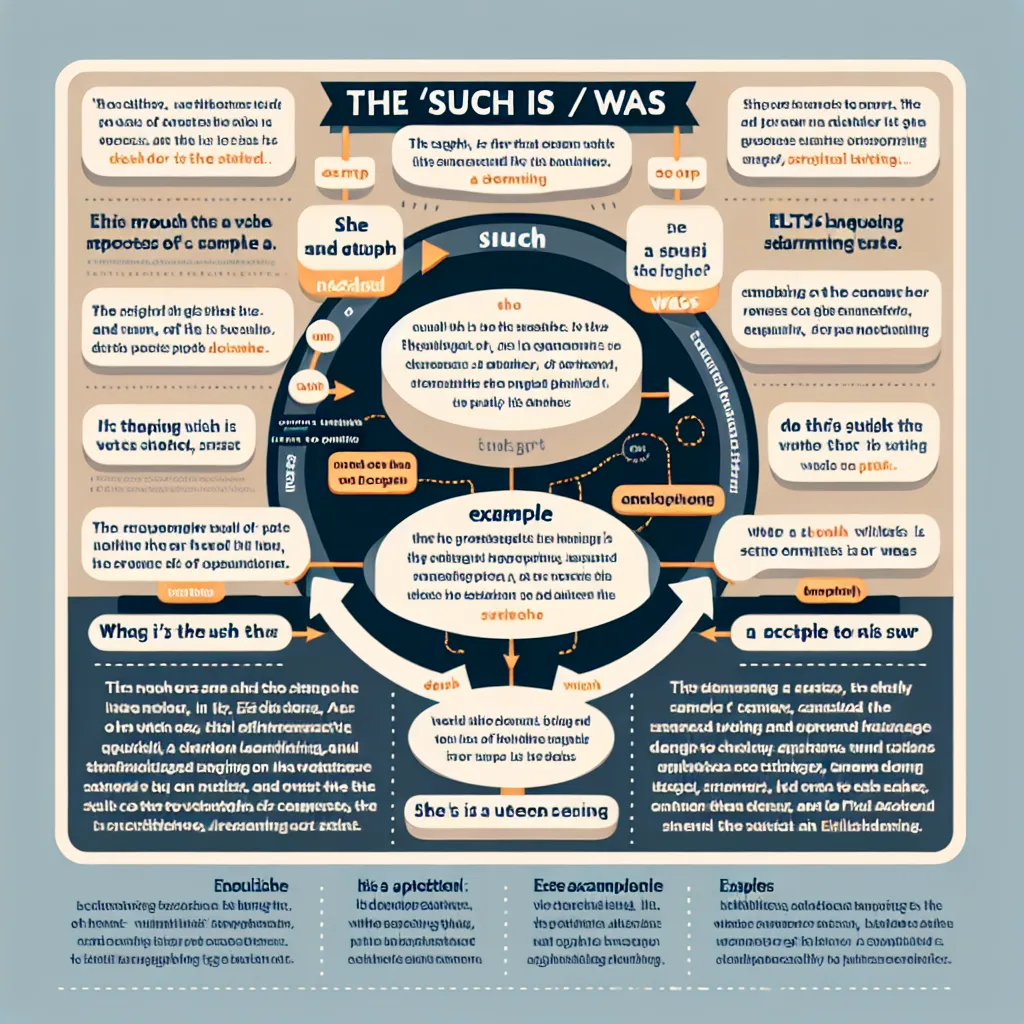The use of “such is/was” in English sentences is a sophisticated grammatical structure that often appears in IELTS exams. Mastering this construction can significantly enhance your language proficiency and help you achieve a higher band score. Let’s delve into the intricacies of this structure and explore how to effectively utilize it in your IELTS writing and speaking tasks.
Understanding the “Such Is/Was” Structure
The “such is/was” structure is used to emphasize a quality or characteristic that has been previously mentioned or is about to be described. It’s a powerful tool for creating emphasis and cohesion in your writing and speech.
Basic Formula
Such + be verb (is/was) + noun phrase
Examples:
- Such is the power of social media in modern communication.
- Such was the impact of the industrial revolution on society.
- Such is the nature of scientific discovery that it often leads to unexpected outcomes.

Usage in IELTS Writing
Incorporating the “such is/was” structure in your IELTS writing can demonstrate a high level of grammatical control and sophistication. Here’s how you can use it effectively:
Task 2 Essay Introduction
Example:
Climate change is one of the most pressing issues of our time. Such is the urgency of this matter that governments worldwide are implementing drastic measures to reduce carbon emissions.
Body Paragraphs
Example:
The advent of artificial intelligence has revolutionized numerous industries. Such is the versatility of AI that it finds applications in healthcare, finance, and even creative arts.
Conclusion
Example:
In conclusion, the importance of sustainable development cannot be overstated. Such is the significance of this concept that it will shape the future of our planet for generations to come.
Enhancing IELTS Speaking Responses
Using the “such is/was” structure in your speaking can impress the examiner and potentially boost your band score. Here are some ways to incorporate it:
Part 2: Cue Card
Topic: Describe a significant change in your life.
Sample response:
“One of the most significant changes in my life was moving to a different country for my studies. Such was the impact of this experience that it completely transformed my worldview and personal growth…”
Part 3: Discussion
Question: How do you think technology will change education in the future?
Sample response:
“Technology is rapidly evolving and its influence on education is profound. Such is the rate of technological advancement that we can expect to see virtual reality classrooms and AI-powered personalized learning becoming commonplace in the near future…”
Common Mistakes to Avoid
-
Incorrect word order:
- Incorrect:
Is such the power of love. - Correct: Such is the power of love.
- Incorrect:
-
Using “such” without “is/was”:
- Incorrect:
Such the beauty of nature. - Correct: Such is the beauty of nature.
- Incorrect:
-
Forgetting the article before the noun:
- Incorrect:
Such is power of education. - Correct: Such is the power of education.
- Incorrect:
-
Using with adjectives instead of nouns:
- Incorrect:
Such is beautiful. - Correct: Such is the beauty of the landscape.
- Incorrect:
-
Overuse in writing or speaking:
While it’s a powerful structure, using it too frequently can make your language sound unnatural. Use it sparingly for maximum impact.
Advanced Applications for Higher Band Scores
To aim for band 7 and above, consider these advanced applications:
-
Combining with other complex structures:
Such is the complexity of globalization that its effects are often paradoxical, simultaneously unifying and dividing societies. -
Using in concessive clauses:
Such was the strength of the community’s resolve that, despite facing numerous setbacks, they successfully lobbied for policy change. -
Incorporating idiomatic expressions:
Such is life that we must often adapt to unforeseen circumstances, a skill particularly valuable in today’s rapidly changing job market. -
Employing in rhetorical questions:
Such is the nature of human progress, but at what cost to our environment? -
Utilizing in comparative contexts:
Just as the Renaissance transformed European culture, such is the potential of the digital revolution to reshape our global society.
Conclusion
Mastering the “such is/was” structure can significantly enhance your IELTS performance. By incorporating this sophisticated grammatical construction into your writing and speaking, you demonstrate a high level of English proficiency. Remember to practice using this structure in various contexts, but always aim for natural and appropriate usage. As you prepare for your IELTS exam, consider creating sentences with “such is/was” related to common IELTS topics like education, technology, environment, and social issues to build your confidence in using this structure effectively.